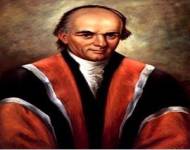Early Life
Alfred Moore was born on May 21, 1755, in New Hanover County, North Carolina. Moore received his early education in Boston before returning to North Carolina to study law under his father, a former colonial judge. Moore was admitted to the bar in 1775 but delayed starting his practice to join the war. From 1775 to 1782 Moore served in a number of ranks including officer of the First North Carolina Regiment.
Legal Career
Following the war, Moore was elected to the North Carolina General Assembly. In 1782, Moore succeeded James Iredell, a future Supreme Court Justice, in the position of North Carolina Attorney General. Moore served as Attorney General until his resignation in 1791. Moore maintained that the General Assembly’s creation of solicitor general in 1790 infringed upon his duties.
Quickly following his resignation as Attorney General, Moore was elected to the North Carolina House of Commons. Three years later in 1794 Moore ran as the Federalist candidate for the North Carolina United States Senate, but lost by only one vote. Moore then served as a Superior Court Judge from 1798 to 1799.
Supreme Court
Following the sudden death of Supreme Court Associate Justice James Iredell in late 1799, President Adams nominated Moore to fill the vacant seat. Moore accepted, and his tenure as U.S. Supreme Court Justice officially began on April 21, 1800.
Due to poor health, Moore’s contribution as Supreme Court Justice was limited. He served on his post for only four years, and during that time only issued one opinion. That opinion came in the 1800 Bas v. Tingy case regarding a conflict with France. Justice Moore supported the majority opinion in the court that a partial, limited war had broken out with France.
During the Marbury v. Madison (1803) hearing, undoubtedly the most important case during Moore’s tenure on the Supreme Court, Moore reportedly missed the arguments due to illness.
Death
Moore resigned from the Supreme Court on January 26, 1804, citing issues with deteriorating health. He died in Bladen County, North Carolina on October 15, 1810.









